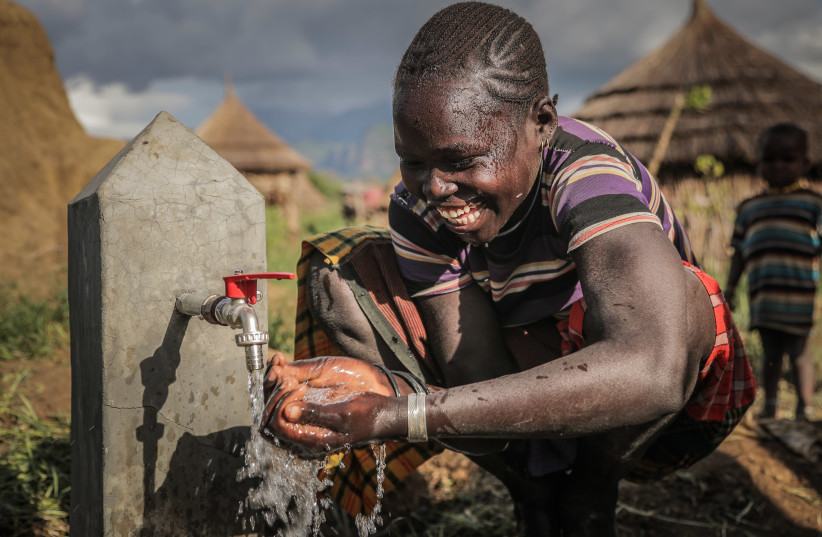Almost 50 years ago, Uganda made headlines when Israeli commandos undertook a daring hostage rescue mission to rescue hostages at the Entebbe Airport.
A less-known piece of history is that this African nation was proposed as a location for a Jewish state during Theodor Herzl’s time. Today, the nation has both an indigenous Jewish presence and ties with Israel. And there is so much potential for bilateral growth that has yet to be tapped.
Uganda holds much tourist potential, being one of the top destinations to see mountain gorillas, so even though there are no direct flights as of yet, this would be a huge reason to boost tourism. Ugandans would likewise want to visit Israel since most are Christian and Muslim, and, so, central to their religious traditions’ history.
In 2021, Uganda’s biggest export to Israel was fish fillets, followed by coffee and perfume plants. Israel’s biggest export to the African nation is broadcasting accessories. Neither nation has a resident ambassador present, and Kenya is used as a bridge for this. While coffee is Uganda’s single largest export, they aren’t among Israel’s top five sources of the product. Uganda and Israel both gained independence from the British. Still, today, most of the bilateral cooperation is economically driven.
Lake Victoria is the second-largest freshwater lake in the world, situated partly in Uganda. A professor from Hebrew University, Berta Sivan, notably assisted the locals with food shortages. An introduced species called Nile perch from northern Africa devastated many native species and this led to malnutrition in some coastal villages.

Sivan’s team applied the knowledge of research on Israeli carp onto African carp aquaculture, building ponds to breed them, and this helped offset the impact of the disaster.
Few know that former Ugandan president Idi Amin actually visited Israel in 1971 and was hosted by none other than the iconic Moshe Dayan, then defense minister.
Israel actually helped build up the Ugandan Army and assisted with numerous construction projects. But in February 1972, Amin suddenly switched sides and took to the Soviet Union/Palestinian camp. He later allowed the PFLP to use the nation to hold the hostages. This culminated in the legendary Entebbe Airport raid in 1976, where Prime Minister Benjamin Netanyahu’s brother Yonatan was killed in the rescue, even though most hostages were retrieved successfully.
An Israeli construction firm named Solel Boneh had constructed the terminal where the hostages were kept, and this information proved critical to the IDF in the logistics behind the mission.
Zionist Uganda
In 1903, the British Empire suggested giving a large chunk of the Mau Plateau to Herzl of the Zionist Federation. The proposal was a response to pogroms in Russia among other ongoing bouts of antisemitism in Europe. It was rejected by many Jewish leaders, even though Herzl was willing to compromise and take a Jewish state anywhere – even if the Levant was his preferred choice.
The proposal was met with hostility by white settlers in Uganda and although the Indian community in Uganda was not entirely against it, there is no evidence of African opposition to it.
Though the rain forests of East Africa may initially come off as an unlikely choice for a Zionist state, a sizeable community of African Jews, the Abayudaya reside in Uganda. The Abayudaya numbers approximately 3,000 individuals today. They were founded by Chief Semei Kakungulu in 1917 who got disappointed with the British authorities and turned to the new religion after reading the Bible. European missionaries would emphasize to wary Africans that the Europeans too had learned the religion from a foreign group from the Middle East.
The chief learned more about Judaism from British and Yemenite Jews visiting or working in the nation, and today the 3,000 Abayudaya are mostly converts and their descendants. The community speaks the Soga and Lugwere languages and has established nine villages.
The community has been in existence for over a century and is Conservative or Orthodox in practice. They even have a local rabbi, Gershom Sizomu. So, a Jewish presence was ultimately created here alongside Herzl’s dream to build a Jewish state in the Middle East.
While they are not recognized by Israel as being halachically Jewish in the same way that Ethiopian Jews are, they keep Shabbat and follow many Jewish practices. The community struggled under Amin but has now made a comeback.
After the fall of Amin’s regime in 1979, Israel-Uganda relations took a while to kick-start. In recent years, however, both countries have worked to build up the gaps. Ugandan President Yoweri Museveni has visited Israel twice since he took office in 1986. In February 2020, Netanyahu visited Uganda. There were discussions about setting up embassies.
Across the border of the landlocked nation is Kenya, a nation that Israel has established firm economic and military ties with. Uganda has faced insurgency from the Lord’s Resistance Army, a Christian millennialist militia, and more recently from ISIS affiliates. Uganda has acquired Israeli military equipment.
Uganda borders newly independent South Sudan, which was once part of Sudan – a nation that most recently recognized Israel.
Uganda has a fertility rate of 4.5 children per woman currently and, hence, a large youth population. Many Ugandan citizens head to the Gulf, including the UAE to work. In addition, Israel has a demand for foreign labor, relying on the elderly getting domestic help from foreign sources, and Uganda has potential in this avenue.
So, while ties exist as we speak, there is still a lot of untapped potential out there in multiple sectors that might be open in the future.
The writer is a Holocaust historian from Sri Lanka. He has lived in many places and speaks 11 languages.
